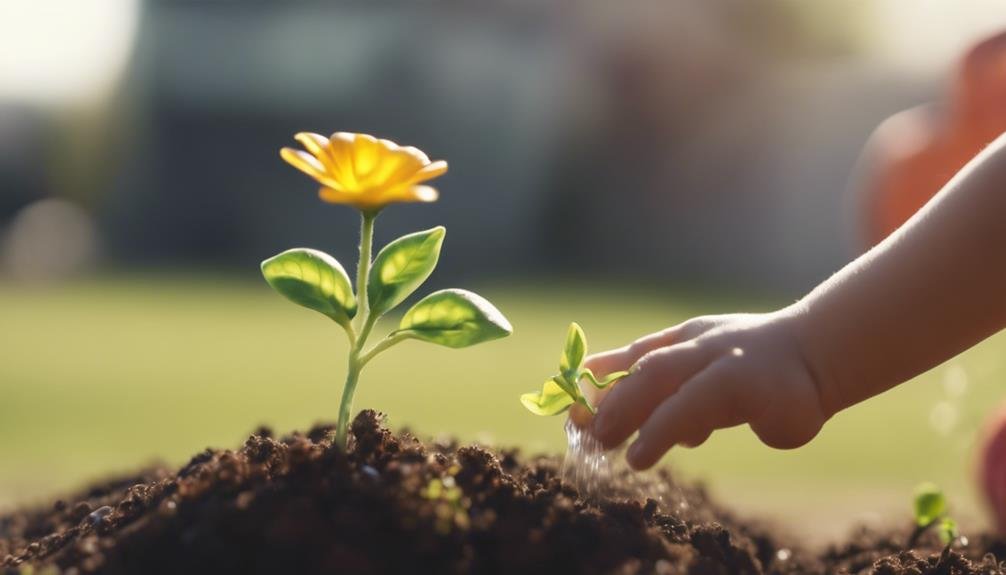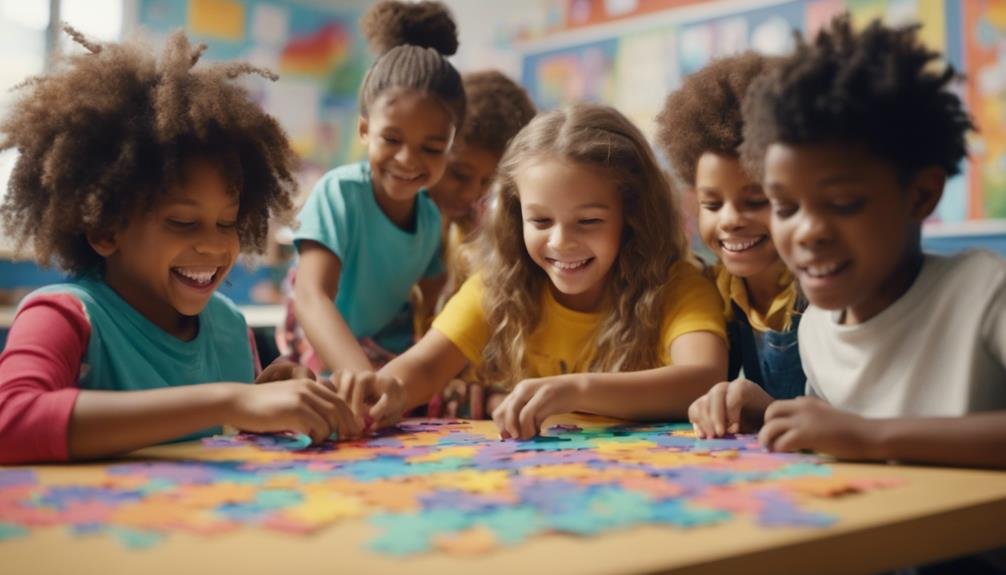"Cherishing Little Steps - A Haven for Baby and Family Journeys"
How to Foster a Growth Mindset in Young Children
So, you think young children are naturally inclined to embrace challenges and learn from failure? Think again. Fostering a growth mindset in little ones takes intentionality and effort.
From understanding the concept of growth mindset to creating a positive learning environment, there are key strategies that can help shape their perspective on learning and development.
But how can you effectively implement these techniques in everyday interactions with children? Let's explore practical ways to nurture a growth mindset in the young minds around you.
Key Takeaways
- Cultivate belief in effort and resilience to instill a growth mindset early on.
- Encourage problem-solving and celebrate progress to foster perseverance.
- Emphasize learning from mistakes and value dedication in children's development.
- Create a supportive, positive learning environment to nurture a growth mindset in young children.
Understanding Growth Mindset

To truly embrace a growth mindset, it's essential to cultivate a belief in the power of effort and resilience. Developing resilience in young children involves instilling in them the belief that challenges are opportunities for growth. By teaching them that setbacks aren't permanent and that they have the ability to bounce back from difficult situations, you're building their confidence in their own capabilities.
Building confidence goes hand in hand with developing resilience. Encouraging children to take on challenges, even when they feel unsure, helps them see that their abilities aren't fixed but can improve with effort. When they experience success after putting in hard work, their confidence grows, reinforcing the idea that dedication and perseverance lead to positive outcomes.
Encouraging Effort and Persistence
Instilling in young children the belief that effort and persistence are key ingredients for growth and success lays a solid foundation for fostering a growth mindset. Building resilience and promoting grit in children is essential for their development.
Here are some practical ways to encourage effort and persistence in young ones:
- Set Realistic Goals: Help children set achievable goals that require effort but are within their reach.
- Celebrate Progress: Acknowledge and celebrate the small steps taken towards a goal to show that progress is valuable.
- Encourage Problem-Solving: Teach children to approach challenges as opportunities to learn and grow.
- Provide Support: Offer guidance and reassurance when they face obstacles, showing them that it's okay to seek help.
- Model Perseverance: Be a role model by demonstrating your own resilience and persistence in the face of difficulties.
Praise the Process, Not the Outcome

Encouraging young children to focus on the process rather than solely on the outcome can nurture a growth mindset and foster resilience. When you praise the effort and the journey taken to reach a goal, you teach children that the process is just as important as the end result. This mindset shift helps them understand that success is not just about getting things right the first time but about learning and improving along the way. Remember, it's about process over perfection and acknowledging that effort matters.
| Process over perfection | Effort matters |
|---|---|
| Focus on the journey | Emphasize hard work |
| Learning from mistakes | Encourage perseverance |
| Celebrate progress | Value dedication |
| Developing skills | Recognize improvements |
| Building resilience | Cultivate determination |
Embracing Challenges and Learning From Failure
Shift your focus towards seeing challenges as opportunities for growth and failure as a stepping stone towards success. Embracing challenges and learning from failure is essential in resilience building and fostering a growth mindset in young children.
Here are some practical tips to help you guide your child through these experiences:
- Encourage a positive attitude towards challenges, emphasizing the importance of effort and perseverance over immediate success.
- Teach your child to view failures as opportunities to learn and improve, rather than as a reflection of their abilities.
- Model resilience by sharing your own experiences of overcoming challenges and setbacks with a positive attitude.
- Celebrate small victories along the way to boost your child's confidence and motivation.
- Provide a supportive environment where mistakes are seen as a natural part of learning and growth.
Cultivating a Positive Learning Environment

Creating a positive learning environment is essential for nurturing a child's growth mindset and fostering a love for learning. In this environment, pivotal reinforcement plays a critical role. Celebrate small victories and efforts, emphasizing progress over perfection. Encouragement and praise can go a long way in boosting a child's confidence and motivation to keep trying. Remember, mistakes are opportunities for learning and growth.
Building resilience is another key aspect of cultivating a positive learning environment. Teach children that setbacks are a natural part of the learning process. Help them develop problem-solving skills and a 'can-do' attitude. Encourage them to see challenges as exciting opportunities to learn something new. By fostering resilience, you equip children with the mental strength to persevere through difficulties and setbacks.
Creating a positive learning environment involves setting the stage for children to thrive, learn, and explore without fear of judgment. Your support, encouragement, and belief in their abilities can make a world of difference in shaping their mindset towards learning.
Role of Parents and Educators
To best support the growth mindset of young children, parents and educators play an essential role in shaping their attitudes towards learning and resilience. Your involvement can make a significant impact on how children perceive challenges and setbacks.
Here's how you can support and foster a growth mindset in the young ones:
- Parental involvement: Engage in your child's learning journey, show interest in their progress, and encourage them to persevere through difficulties.
- Teacher support: Collaborate with educators to create a consistent approach that reinforces the importance of effort and resilience.
- Consistent reinforcement: Provide regular feedback that focuses on the process and effort rather than just the end result.
- Positive reinforcement: Celebrate small victories and efforts, highlighting the value of hard work and dedication.
- Model growth mindset: Demonstrate your own willingness to learn and grow, showing children that it's okay to make mistakes and learn from them.
Together, through your guidance and support, you can help young children develop a positive attitude towards learning and facing challenges.
Frequently Asked Questions
How Can Parents and Educators Address a Fixed Mindset in Young Children Before Fostering a Growth Mindset?
Address a fixed mindset in young children by recognizing behavior patterns that limit growth. Encourage a growth mindset through positive reinforcement, praising effort over outcome. By fostering resilience and curiosity, you can instill a belief in continuous improvement.
Are There Specific Activities or Exercises That Can Help Young Children Develop a Growth Mindset?
You can engage in growth mindset activities with your child to boost their mindset development. Simple mindset exercises, like praising effort over outcome, can positively shape their child psychology and nurture a resilient mindset.
How Can Parents and Educators Address Setbacks or Failures in a Way That Promotes a Growth Mindset?
When setbacks occur, remember to embrace challenges as opportunities for growth. Reflect on what went wrong, encourage perseverance, and celebrate progress. By modeling resilience and utilizing positive reinforcement techniques, you can foster a growth mindset.
What Role Do Peers Play in Influencing a Child's Mindset and How Can This Be Addressed?
In the journey of growth, your peers serve as guides and companions. Their influence can shape your mindset. Intervene by fostering positive social interactions and offering encouragement. Together, you can cultivate a mindset that thrives on challenges.
How Can Parents and Educators Differentiate Between Genuine Effort and the Need for Improvement in Young Children's Learning Experiences?
You can differentiate effort by observing engagement and persistence. Identifying improvement involves tracking progress and setting small goals. Celebrate achievements and provide specific feedback to encourage continuous growth and learning in young children's experiences.
Conclusion
You've planted the seeds for a growth mindset in your young ones. Keep nurturing them with love, guidance, and patience. Like a gardener tending to their garden, watch as their minds bloom and grow.
Embrace the challenges, celebrate the efforts, and learn from the setbacks. Together, we can create a bright future filled with endless possibilities for our children.
Keep watering their minds with positivity and watch them flourish into resilient, confident individuals.


